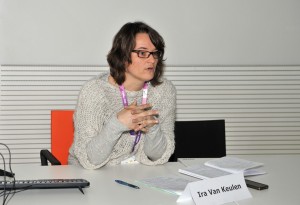| Chairs | Ira van Keulen |
| Day and time | Wednesday, March 13th, 2013: 15:45 – 19:00 |
The neurosciences are the new cutting edge in biomedicine: yet, they are more than a collection of scientific practices – they offer new ways of thinking about mind, body and society. A good reason for technology assessment practitioners to pay attention to this relatively new area of the natural sciences. Up to now, it has been mostly ethicists who have opened up discussions on the important sociotechnical issues neuroscientific research raises. As the neurosciences gain more traction within professional arenas – also outside the medical arena in domains like education and justice – policy processes and popular culture, it is time for the TA community to contribute to this fast developing scientific field.
In this session, five presentations with different TA perspectives focused on (neuro)imaging technologies for research and diagnostic purposes as well as on therapeutic neurotechnologies like deep brain stimulation (DBS), transcranial magnetic stimulation (TMS) and EEG neurofeedback.
The three presentations from the VU University of Amsterdam entailed a constructive technology assessment (CTA) approach. The aim of their research (programme) is socially responsible innovation of neuroimaging applications in different domains: health care, justice and security and education. Their research facilitates a dialogue between neuroscientists, end-users and other stakeholders which should result in directing neuroimaging innovations in an early phase towards shared desirable applications with few or at least manageable negative impacts.
The contribution from the University of Lissabon was a health technology assessment approach. It investigates how socially responsible access to (neuro)imaging technology for a growing ageing population living in the Portugese countryside can be facilitated.
The last presentation from the Rathenau Institute took on a TA approach in which the legal embeddedness of three therapeutic neurotechnologies in European law is researched. The aim of the study is to investigate whether such neurodevices enter the European market in a socially responsible way: can safety and performance be sufficiently guaranteed?
Questions for the discussion were: what is the distinct contribution of the different TA approaches to the field of the neurosciences? Does TA research in the neurosciences differ from TA research in other biomedical fields? How can these TA contributions be effectuated in (socially responsible) policy and decision making? And others.
The abstracts of the session can be read here.
Presentations of the session:
- M.E. Arentshorst
Future-oriented technology analysis: Steering medical neuroimaging
- M. De Jong
- R. Edelenbosch
Neuroimaging and personalised learning: Reflections with societal stakeholders
- M.J. Maia/ A. Moniz
Equity in access to MRI equipment in an ageing society: A Portuguese case
- I. van Keulen/ M. Schuijff




